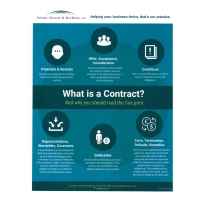
Computer technology, software and systems are vital to businesses of all sizes. Antheil Maslow & MacMinn attorneys have extensive experience representing software vendors, computer consultants and other provider-side parties of the technology equation, as well as customers in the industry. We are also familiar with the unique issues facing software developers, including the use of open source software and trade secret protection.
From negotiating and drafting contracts for development through complex litigation relating to failed software and systems development projects, our Business & Finance Practice Group helps clients in the Greater Philadelphia area including Bucks County and Montgomery County reap the advantages of regulations, policies and the commercial environment affecting the way they do business. Our work includes drafting and reviewing all types of technology-related contracts, including:
- Non-disclosure Agreements
- License Agreements
- Support and Maintenance Contracts
- Consulting Work for Hire Agreements
- Joint Development and Marketing Relationships
- Website Development Agreements
- Source Code Escrow Arrangements
Antheil Maslow & MacMinn Intellectual Property attorneys assist clients in obtaining trademarks and copyrights, performing searches and rendering registerability opinions. Because we are a full service firm, our Inellectual Property lawyers work with our business lawyers to draft employment contracts ensuring the protection of corporate-owned trade secrets.
Legal experience includes conducting trademark clearance searches regarding the availability for use and registration of trademarks in the United States; preparing assignments and licenses with respect to transfer of intellectual property rights; and general counseling on promoting business interests through the protection, enforcement and management of intellectual property rights.
Our knowledge of intellectual property law enables our Business & Finance Practice Group to give clients the information and tools they need to safeguard these valuable assets, including:
- Patents
- Trademarks
- Copyrights
- Trade Secrets
- Unfair Competition
- Emerging Forms of Protection, including Internet Domain Names
When there are two or more equity holders, a Buy-Sell Agreement is a powerful tool to help control a company’s future. Contractually determining what happens to the company stock after a triggering event (termination of employment, disability, death, third party offers) can avoid shareholder disputes and can also solve some of the owners’ estate planning problems. While no single, sure-fire method of determining the price exists, having a well thought out formula and contractual obligation to regularly update the valuation of the stock price is essential.
Addressing this most basic concern in the Buy-Sell Agreements it prepares for its clients, AMM also attempts to provide a broader frame-work for shareholder relations. Should majority rule always prevail or are there situations that may require a super-majority vote? How should irreconcilable differences be resolved without destruction of the company? All of these issues and more can be addressed by what is often referred to mistakenly as a simple “Buy-Sell Agreement”. Antheil Maslow & MacMinn will help craft a document that fits all of its client’s specific needs.
NON-PROFIT FORMATION
Forming a non-profit organization involves several steps. Those seeking to form the organization must first choose any appropriate structure. The choice of entity depends on many of the same factors used in choosing an entity in the for-profit context. Depending on the choice, formation requirements vary, but will generally require the development of governing documents such as Articles of Incorporation or Certificate of Formation and Bylaws. Formation also requires the recruitment and appointment of appropriate Board of Directors/Trustees and an Organization Meeting. In addition, the non-profit should obtain an Employer Identification Number (EIN).
Once the non-profit is formed and has an EIN, it will generally seek treatment as a tax-exempt entity. The application for tax-exempt status is done at both the federal and state levels. The application will include a determination on whether the organization should be classified as a public charity or a private foundation. The determination generally depends on where the organization intends to secure the majority of its funds. A public charity, as the name implies, is “publicly supported” or is supported by other public charities. Private Foundations, on the other hand, generally receive most of their funding from one or a few large, private donors.
Antheil Maslow & MacMinn has helped form numerous non-profit organizations and has obtained tax-exempt status for many of our clients. Our attorneys can assist you in identifying the best structure for your non-profit and guide you through the steps required to qualify for tax-exempt status and to implement the processes that will secure the continued enjoyment of that status.
ENTITY CHOICE
Choosing the right type of entity for you business is one of the most important decisions a business owner must make. There are many forms to choose from such as C Corporation, S Corporation, Limited Liability Company (LLC), General Partnership, Limited Partnership (LP), Limited Liability Partnership (LLPs), Professional Corporation, Business Trusts, and even tiered structures using several forms of entities. Business owners should consider a number of important factors when making a decision including the owners’ need for limited liability, who will manage the business, availability and flexibility of capital and financing, the transferability of ownership, and taxes. Antheil Maslow & MacMinn works with its clients to identifying the best entity for your unique situation.
JOINT VENTURES & STRATEGIC ALLIANCES
Individuals and entities may enter into joint ventures and strategic alliances for a variety of business reasons; for example, to pool resources for research and development of a prototype; to jointly manufacture an existing product; or to share distribution channels in the marketing or distribution of products. While usually intended to be limited and temporary in nature, sometimes these relationships are used as stepping stones to evaluate the advisability of a more
Whether you are an entrepreneur or a CEO of a multi-national corporation, business contracts are critical to the success of your enterprise. AMM can assist you in any stage of a contract-based issue - developing new contracts, reviewing existing contracts, or enforcing your rights. We have handled all types of contracts from simple leases to complex agreements involving property, employment, vendors and customers. Our attorneys have a comprehensive knowledge of contractual issues and can handle any documents necessary to help the management of your business relationships.
It takes years, sometimes a lifetime, to build a business. Along the way, every business owner makes huge investments of time, capital, energy and vision to grow and sustain the enterprise. For business owners with a substantial portion of their net worth tied up in the business, it is never too soon or too late to develop an exit strategy. That strategy should maximize the value you receive from the business and minimize the tax bite. An exit strategy involves developing a plan for passing on responsibility for running the business, transferring ownership, and extracting your investment. Because a stable business is worth more than an unstable one, creating a seamless transition is essential to maximizing value. This requires planning while the company is in good economic health and management is in place. We can explore with you alternative strategies used to provide exit for business owners and assist you in determining which is appropriate for your business now and as it may evolve.
Establishing a succession plan to ensure your business survives the transition to the next generation of leadership and management is a crucial step in the life of every business. The investment in a strong strategic plan demonstrates to your clients, employees, lenders, suppliers, and co-shareholders that the survival and continued growth of your business is a top priority. The benefits that a strong vision for the future inspires can’t be overstated, and shouldn’t get overlooked.
Our firm has been advising owners of family and privately held businesses for over 20 years. We pride ourselves on developing deep relationships with our clients by taking time to understand their businesses and goals so that we can provide personalized, practical and effective advice to address each company’s unique challenges, objectives and needs. Our transactional, finance, employment, tax and estate planning practice groups bring a depth of knowledge, insight and experience to the complex issues and concerns which are central to establishing a comprehensive and cost-effective succession plan to safeguard the future of the business you worked so hard to build.
Our attorneys work closely with owners, family members and key employees to identify intergenerational issues and conflicts which threaten successful transitions in leadership business continuity. Our business succession team is adept at assisting all relevant parties through the necessary steps of conflict resolution, consensus building and amicable compromise which are crucial in transition planning.
We have extensive experience with all variations of succession planning, including intrafamily transfers via straight gifts, intrafamily sales via the use of grantor retained annuity trusts, defective grantor trusts, and similar mechanisms. Similarly, we frequently implement plans that involve transfers to management via traditional management buyouts, issuance of ownership interests as compensation (e.g., stock bonus plans, nonqualified stock options, partnership/LLC profits interests), and employee buyouts via Employee Stock Ownership Plans.
In some succession planning cases, it is necessary to look outside the family and outside the business for ownership and management succession. In such a case, it is important to take appropriate steps maximize the value of the business at the time of the sale. Assistance of legal counsel is essential for purposes of (i) the corporate housekeeping often required prior to initiating third party sale efforts, (ii) the search and selection of the right strategic buyer, and (iii) the negotiation of favorable terms in the sale of assets or equity.
AMM’s Succession Planning Services Include:
• Evaluation of the business to assess its profitability, financial health, business objectives and
prospective successors;
• Assessment of alternative transition structures to maximize tax and cash flow objectives for
both existing and projected leadership/ownership;
• Assistance to owners in obtaining valuation information in order to draft equitable buy/sell
and similar valid succession agreements;
• Development of estate planning documents which provide for ownership transfers;
• Identification of possible conflicts and issues when not every family member is involved in the
business, and coordination of the discussion and resolution of issues that may arise during
transition;
• Facilitation of conflict resolution procedures in relation to future management of the
business.
Representative Business Succession Planning Experience:
Our attorneys have created succession plans for a wide range of business sectors including:
|
|

